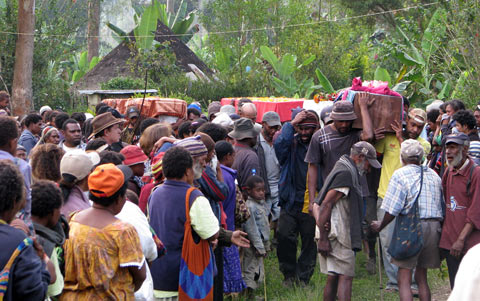At almost every funeral that I can remember attending, there has been at least one person whose eulogy has been a reminder that “we are here to celebrate the life of …” I know I said it at my mother’s passing in December 2000. But this statement, which evokes fond memories of our loved one, has also not prohibited me from wondering ever so often whether those of us from the developing world, particularly Africa, are not exaggeratedly misplacing priorities by how much is spent and sacrificed for the dead over the living. I am wondering how much we are spending when our loved one is sick and dying on a hospital bed or at home? Is that cost more than or less than the funeral costs?
Let me begin with this disclaimer: I am not telling anyone how they should mourn their dead. Not a single one of us has the luxury of the breathing and walking Christ, like Lazarus in the Bible did, to be ordered back to life by his close friend. We, however, have the opportunity, I will maintain, to give as much love and flowers to our loved ones when they are alive, rather than waiting to shower them with tears and crown them with wreaths at death.
Cry Laugh
Just recently, we were celebrating on Thanksgiving Day at the home of close friends. The third couple, from Uganda – East Africa, cracked a joke about the growth of the industry of professional mourners back home. Yes, professional mourners they said. What I gathered from the tale is that the professional mourner is paid to shed tears in abundance for the family. They are given a rundown of the life story of the departed and they play the live reel at the funeral.
At a very primary, yet germane level, it speaks to an appalling degree of detachment for dramatization that I would rise from the dead to banish at my funeral. Worse still, it speaks volumes not only of what people will do to rob others when they are most vulnerable and hurting, it conversely shows how the grieving are willing to share their misery while displaying wealth, or poverty, in the name of the dead.
Fashion Runways
 There is little debate that whether in destitute communities in Cameroon and elsewhere in Africa, or in African households across the Diaspora, a disproportionate chunk of immigrants, like their peers back home, are literally breaking banks and or indebting themselves to absolve the ever growing funeral costs. In a recent piece by Milton Nkosi of BBC News in Johannesburg, South Africa, the writer eloquently visits how funerals have fast become another runway for fashion wannabes.
There is little debate that whether in destitute communities in Cameroon and elsewhere in Africa, or in African households across the Diaspora, a disproportionate chunk of immigrants, like their peers back home, are literally breaking banks and or indebting themselves to absolve the ever growing funeral costs. In a recent piece by Milton Nkosi of BBC News in Johannesburg, South Africa, the writer eloquently visits how funerals have fast become another runway for fashion wannabes.
Monetary reprieve granted by Insurance companies, where and when the departed is insured, has only exacerbated the matter by making funerals more grandiose. Families that fail to go all out on a spending frenzy are not only called names, but also ridiculed and snubbed; it is even more unbearable for families that decide that the burial of their loved ones will be wherever the death occurred. It does not matter that reasons for burying in the United States, Europe, Asia or Australia may include an expressed wish by the dead person; that it may be because they have lived in the Diaspora for so long they barely have any ties back in the homelands; that they have family here, including spouses and kids, who are more likely to visit their graves than if they are buried in the village and forsaken half a world away.
Longer Funeral Waits
Whatever the case, little is to be argued that many funerals are competing with pregnancies in terms of their duration. In many instances corpses are frozen, and others literally abandoned at the mortuary for as long as a year, making month long to three months funeral arrangements look very normal. Why people stretch out the process is anyone’s guess.
Certainly, there is an abundance of, as well as legitimate reasons that compel many families to embalm or freeze the bodies of their departed ones. Travel schedules for far-flung out family members and relatives; availability of funds; involvement of the federal government where the departed was a high ranking civil servant or military official or traditional royalty… However, there are many more prolonged waits that are on account of the surviving family wanting to top it and make “it” the funeral of all times.
ASAP Waits – Islam
While there may be no scientific study to support this claim, there is no denying that elastic funeral programs are predominantly practiced within Christian and atheist circles in African communities. The Muslim practice has consistently been to bury the corpse as soon as specific rites are performed for the treatment of the body after death. A Muslim friend tells me that in Madrassa (Islamic religious schools) they were taught that God sends angels to come for the soul as soon as it has been secluded.
As an adult, however, my friend has read many more educated pieces on the subject by Muslim scholars. One of the reasons for the quick burial is to keep the body in its natural state, free of the chemical stuff involved when a body is embalmed. But there are equally historical and environmental reasons he learnt. The scorching heat in Saudi Arabia, the birthplace of Islam, was not a conducive environment to keep the body without rapid decomposition and health risks.
Most of all, however, it is the simplicity of the Muslim burial that has always struck me. The deceased are wrapped by a single piece of cloth for burial and without a casket, be it on land or at Sea. How much more expensive can that get? No extravagant casket whose cost could go into paying tuition for a surviving family member whose research can go on to change the world. No jewelry to attract thieves who are desecrating graveyards. No body for the same thieves to rob and sell to the highest bidder.
From dust to dust – Cremation
Such simplicity in approach by Muslims is equated in other religions and cultures by the process of cremation. While Islam and other faiths disapprove of cremation, the over 20,000 years-old practice has, in modern times, had significant comparative cost advantages over traditional burial. Online crematories advertise their services for $555.00 and sometimes lower in smaller US cities.
In Cameroon, and Africa in general, it is anathema to even mention the word by some elders or family members, just as it is to hear one of us say that we are an organ donor. It is not only considered alien, it carries with it some stigmatization befitting of family cleansing. But it is an option that has to be put on the table even as families go bankrupt and live long in debt after performing the burial rites of their loved ones.
Africa cannot be seen to be building economies based on funeral services. It is not sustainable for any party – individuals or families – that are forced to spend to death. Indeed, in my village of Kom the traditional authorities have continuously made progressive social decisions that reflect the economic tempo. For instance, several years ago the supreme traditional authority observed that as HIV/AIDS ravaged the young adult population and precipitated mortality rates, chicks were brought to funerals in place of hens and cocks. People were bringing chicks because the cocks and hens could not grow fast enough before the next death, and the next…The Palace had to step in. In the most recent development, it is prohibited in Kom to have any wakes with the corpse. Any corpse that is brought into the village has to be buried on the same day before dusk.
Now, you ask, what has that got to do with anything? Well, the traditional authorities are going back in time to do their best to prevent diseases that may come from a decomposing body or toxins from the morgue. Of economic value also, the decision drastically cuts expenditure that would otherwise arise from an extra wake with the body – the drinks, the food and craziness to entertain the crowd.
In Conclusion
The scramble to keep up with the trend is certainly befuddling and we are nowhere close to retrenching. But the trend is not only hurting individuals and families; it is a trend that has neither benefits nor dignity to it. In a recent article on www.chiareport.com, I highlighted the existence of a Cameroonian group in Maryland (SAGI), which cuts the costs of repatriating corpses by up to 1000 per cent for registered members. The piece also looked at how cultural groups can organize themselves and sign up for term life insurance benefits with various carriers, thereby saving families a lot of money when death makes the call.
Individuals have to examine the matter and make the decision whether their legacies will be determined by the grandeur of how their remains are disposed, as opposed to how they lived their lives and impacted their communities and the world at large. Above all, it needs to be written out in a living will, with black ink over white paper, how we want our remains to be disposed. We need to state whether we want to perpetrate this issue or become part of the solution that will prevent financial insolvency in some families.
As I told my wife, my choice is a pretty simple one – cremate my body when that time comes…unless I become an organ donor before then. But I have also seen families override wills because they are egregiously unaligned with respective cultural practices.
(First published DUNIA print Magazine – issue 6)
Innocent Chia blogs on www.chiareport.com; Twitter: @InnoChia


Worth the reading. Would quickly recommend this article to as many people as possible. The issue addressed is fast becoming a crisis and someone had to speak out about this. The author has spoken,those who have eyes and ears,and are open enough to embrace ground-breaking changes to long time hazardous practices can gladly take something home. Some times one good person says or writes something most of us have always had in mind and reflected upon,without finding the right way to parcel our thoughts. I would say in this case,Innocent helped most people,to carefully parcel their fine thoughts and hidden reflections, and has made it so attractive to capture even the die-heart traditionalist.
The third couple, from Uganda – East Africa, cracked a joke about the growth of the industry of professional mourners back home. http://funeral.coverquotes.co.za/
We realize that in the current times, when the prices of all common commodities are rising day by day, it would not be easy to reduce the cost of funeral ceremony to a great extent, but we can help getting a wide range of inexpensive ashes casket, as a mark of tribute to a lost soul.